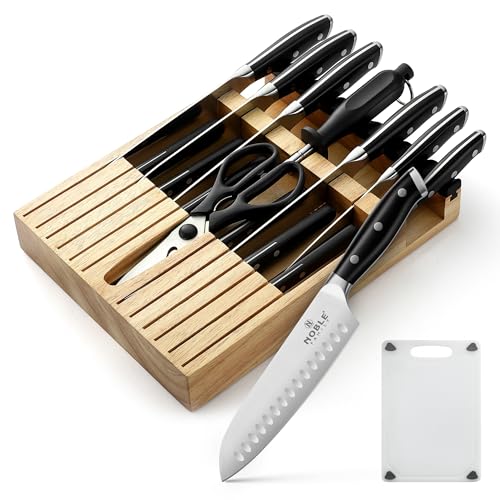I'm gluing up some hardwoods for a knife block. I'd like to coat the insides (the slots for the blades) with mineral oil before gluing with Titebond3. Any reason this approach might cause problems? TIA.
You are using an out of date browser. It may not display this or other websites correctly.
You should upgrade or use an alternative browser.
You should upgrade or use an alternative browser.
Mineral oil and wood glue?
- Thread starter Ericfg
- Start date

Help Support Kitchen Knife Forums:
This site may earn a commission from merchant affiliate
links, including eBay, Amazon, and others.
Not sure about the mineral oil, but be aware that Titebond is acidic. You'll want to ensure that the slots are free of glue.
You could always glue it up and then soak in oil - similar to what is done with a cutting board.
oiling the wood won't help your knives they'll still rust and if you build it right the blades wont touch the woodI'm gluing up some hardwoods for a knife block. I'd like to coat the insides (the slots for the blades) with mineral oil before gluing with Titebond3. Any reason this approach might cause problems? TIA.
Not concerned about rust, I can handle that. My question was about oil and glue. Don't put the cart ahead of the horse.oiling the wood won't help your knives they'll still rust and if you build it right the blades wont touch the wood
I think this is the correct answer. I'll pull a oil-soaked cloth through the gaps after gluing and sanding. Thanks for the help!You could always glue it up and then soak in oil - similar to what is done with a cutting board.
FYI. I just check the manufacturers website and they state:
"Get better results gluing woods that are oily or high in tannic acid.
When working with woods that are high in tannic acid or are considered oily, wiping the joints with acetone before gluing them up ensures a good bond. Acetone clears the contaminants from the wood's pores on the bonding surface and dries quickly without leaving any residue. A good bonding surface can also be achieved by sanding or planing the wood just before gluing the joints.McMan
Senior Member
- Joined
- Feb 15, 2018
- Messages
- 2,757
- Reaction score
- 3,392
This just means naturally oily woods, like amboyna. This is a far cry from wood that's oiled with mineral oil, which will have a much, much higher oil content.FYI. I just check the manufacturers website and they state:
"Get better results gluing woods that are oily or high in tannic acid.
When working with woods that are high in tannic acid or are considered oily, wiping the joints with acetone before gluing them up ensures a good bond. Acetone clears the contaminants from the wood's pores on the bonding surface and dries quickly without leaving any residue. A good bonding surface can also be achieved by sanding or planing the wood just before gluing the joints.
I wouldn't touch them with oil until after gluing. I'd agree with oiling after which seems what you're going with. I made a knife block to mount next to my island less than a week ago. Rushed the the project as usual, ended up being to close to countertop for some handles. Already oiled it with several coats and wax.
Long story short I cleaned it with acetone and was able to glue a spacer board on the back with no issues. Granted, I use CA glue.
Long story short I cleaned it with acetone and was able to glue a spacer board on the back with no issues. Granted, I use CA glue.























